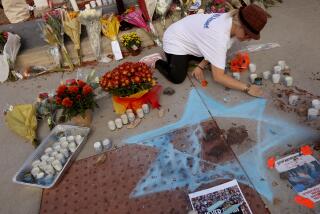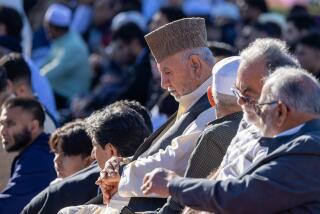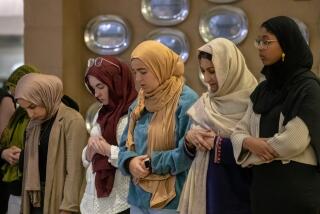London’s Finsbury Park built trust between Muslims and others, and it paid off

Reports of Islamophobic attacks have surged in Britain. (June 21, 2017) (Sign up for our free video newsletter here http://bit.ly/2n6VKPR)
When the Ramadan fast ended for the day around 9:30 p.m., Muslim men packed into Cafe Salaam on Rock Street to eat.
A group of Algerians hung outside chatting in Arabic, sipping coffee and exchanging animated stories about what went down the night before.
A man had driven a rental van into a crowd of worshipers near a mosque in London’s Finsbury Park neighborhood early Monday, injuring 11 people and leaving one man dead, perhaps from natural causes. A suspect, identified by British media as Darren Osborne of Cardiff, Wales, was handed over to police, who charged him with attempted murder and other crimes.
While the driver appears to have deliberately targeted Muslims, the men at the cafe said this was not a place, or a city, where they felt unsafe or targeted. And the response from the wider community has lifted their spirits.
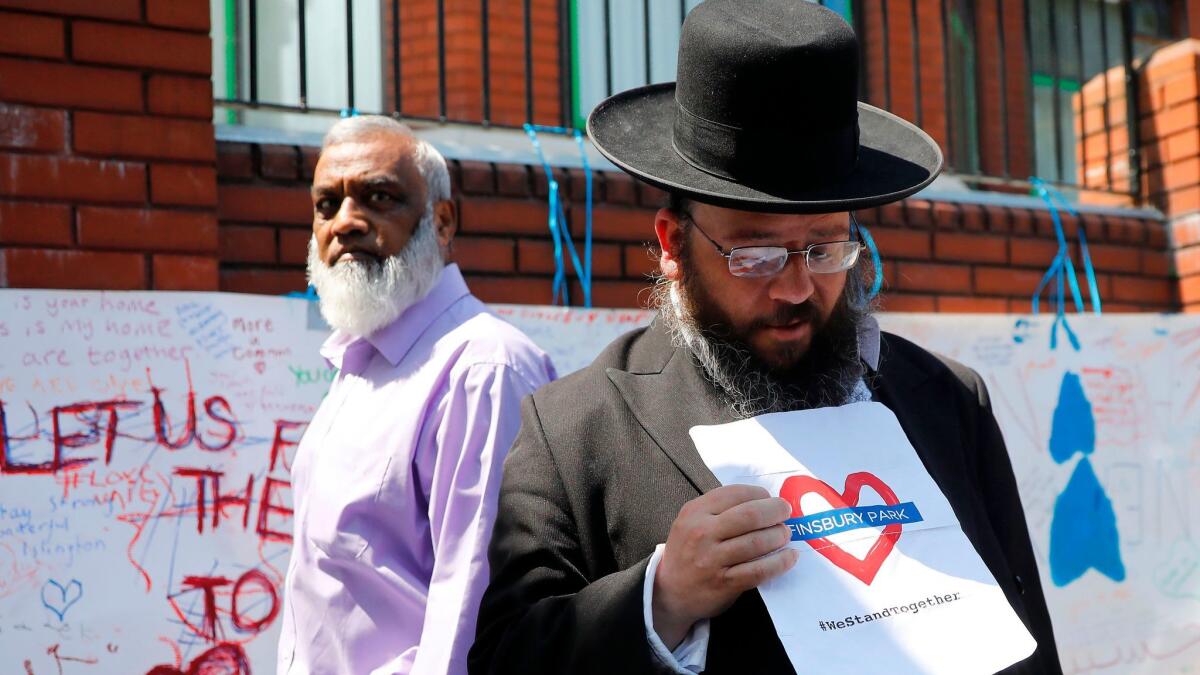
“I feel that people were with us today, they feel sorry, they’re trying to help,” said Adam Ayman, 30. “We have been fasting and people were bringing us water and asking if we need something. When you see that, that’s the moment you see the community you live in. It feels very good and I appreciated each person. I hope I can do the same to them.”
Reports of Islamophobic attacks have surged in Britain in the aftermath of the Manchester Arena and London Bridge attacks in the last two months, which killed 22 and eight people respectively, and injured dozens more. The militant group Islamic State claimed responsibility for both.
But as the police barricade was lifted on Seven Sisters Road in Finsbury Park, streams of people carrying roses walked to the Muslim Welfare House, the mosque and community center near the site of the attack. Several hundred people — different ages, races, religions — stood in the street at a vigil organized by the mosque to honor the victims.
Some held signs reading “Love Will Win” and “United Against All Terror.”
“We’re in a situation in the U.K. where you’ve got a concatenation of violence ... and [a] very febrile social and political situation that could lead to more violence,” said Raffaello Pantucci, the director of international security studies at the Royal United Services Institute. “I think the majority of people in the U.K. don’t want to see the social tensions that groups in the extreme right or Islamists want to tear our society apart.”
The choice of Finsbury Park for the attack, widely thought to have been in retaliation for recent attacks in London carried out in the name of Islam, has perhaps not surprised locals who are aware of the area’s notorious past.
It was where the radical preacher Abu Hamza, with his distinctive hook for a right hand, once made a name for himself, seizing control over the Finsbury Park mosque in the late 1990s and delivering inflammatory sermons — initially in the building, and later on the sidewalk outside when authorities raided and shut down the mosque in 2003.
“The mosque was a prominent place in Europe for all jihadis, where you could go and rest and recuperate,” said Pantucci. “Look back at the Guantanamo documents and see people referring to it as a place they knew about. It was always known as a place that was a source of problems, and everyone knew about it.”
The Egyptian-born Abu Hamza was eventually arrested and found guilty of inciting violence by a British court in 2006 and sentenced to seven years in prison. In 2014, he was extradited to the United States to face terrorism charges, for which he was sentenced to life in prison without parole.
That troubled legacy is now in the past as the result of a massive collaborative effort between a diverse partnership: the new mosque’s trustees; the Labor leader Jeremy Corbyn, who is the local member of Parliament; other faith leaders; and a unit within the Metropolitan Police’s counter-terrorism unit.
Daily prayers are back at capacity, with up to 2,000 worshipers at a time.
The chairman of the mosque, Mohammed Kozbar, said the biggest challenge was rebuilding trust, both among Muslims who had abandoned the place and with the larger community.
“This was a big challenge for us and we worked hard,” he said. “We can see now we have the trust of the community and people can see that the mosque is completely different than it was before.... This gives us the strength to keep going to do things right and make sure our community are looked after by us.”
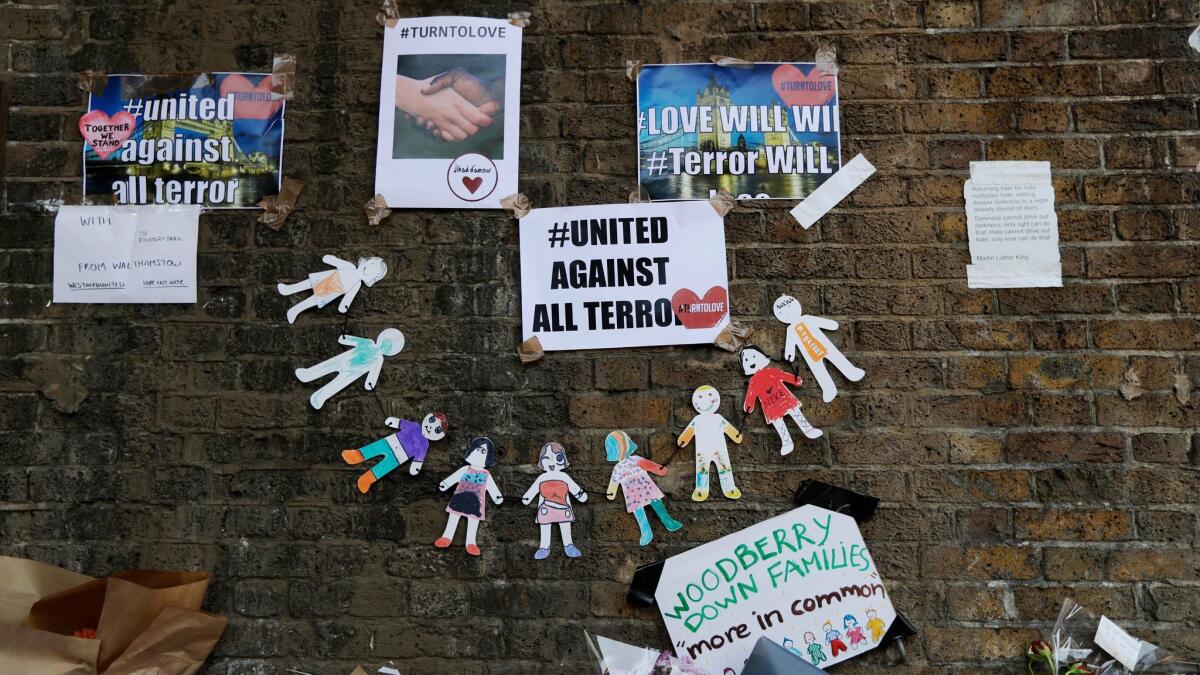
As a result of these efforts, it did not take long for both this North London neighborhood, and the wider city, to reject the narrative that the attack was somehow different from other recent incidents on London Bridge and Westminster Bridge and in Manchester.
To them it was simply terrorism. Any other description shows a lack of understanding of what Finsbury Park is today, residents say.
Outside the mosque, a sign was placed against the wall on behalf of locals. It read: “We stand by you. We are shocked and saddened with you. We won’t let this hatred divide us. We need you in Finsbury Park.”
Like much of London, Finsbury Park is a rapidly gentrifying area. Kebab houses and Arabian cafes sit alongside artisan coffee shops and boutiques.
But those who live here tell of street parties, communal barbecues and recipe swapping with residents of all religions and backgrounds.
This is not a neighborhood fraught with tensions. Nor is it a “melting pot,” some residents say.
“That tends to suggest that the ingredients are all thrown in together and aren’t mixing well,” said Simon Sampson, 46, who lives a few doors from Finsbury Park mosque. “We choose to be here. We haven’t been chucked in the pot by some other force.”
Sampson said he came close to tears Monday when he stepped outside his door and saw the vigil.
“This is a tight-knit community,” he said. “Since we have been here, we couldn’t ask for better neighbors. It’s very diverse, very cohesive. It’s really live and let live and everyone respects each other.”
When Phabian Adams heard the sirens and a police helicopter hovering low overhead in the early hours of Monday, her first thought was that a thief was on the loose.
Terrorism did not cross her mind.
Sitting on her stoop beside her two children the next day, Adams marveled at the scene down the road, where the world’s media had gathered along with countless police, spectators and others.
But her overriding feeling was one of anger that the community she has lived in for most of her 35 years was targeted.
“I was quite aggrieved,” she said. “We have worked so hard to be a community. We have street parties and everyone comes out with food, to talk and celebrate. Our communities are integrated.”
Once the camera crews have left and life returns to normal, Adams predicts, the solidarity will continue.
“A bad thing has happened like in Manchester and London Bridge, but life is going to continue,” she said. “ I don’t think this attack is going to stop me from saying, ‘Let’s have a barbecue.’”
Boyle is a special correspondent.
ALSO
Residents lash out at officials over response before and after London apartment tower fire
Divorce talks finally begin between Britain and the European Union
Reeling from its deadliest forest fire, Portugal finds a villain: eucalyptus trees
More to Read
Start your day right
Sign up for Essential California for news, features and recommendations from the L.A. Times and beyond in your inbox six days a week.
You may occasionally receive promotional content from the Los Angeles Times.
